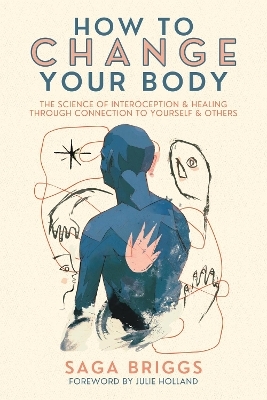
How to Change Your Body
Synergetic Press Inc.,U.S. (Verlag)
978-1-957869-10-0 (ISBN)
What if symptoms from some of our most common afflictions—everything from depression and anxiety to addiction and PTSD—could be traced back to a disconnection from our bodies?
How to Change Your Body explores this provocative question through a rigorous yet playful collection of interviews with scientists, somatic workers, and artists from around the world to uncover the social-emotional aspects of so-called mental illnesses. Saga Briggs is our compassionate guide, pairing peer-reviewed research with moving personal vignettes about her journey away from alcohol dependence to draw a profound link between bodily awareness, social connection, and mental well-being. Interoception, regarded by some as our eighth sense, is fundamental to human health and, Briggs argues, lies at the heart of many techniques shown to improve our relationships to ourselves and others, including psychedelic-assisted therapy, synchronous movement, and energy work.
Whether you are facing a mental health diagnosis or simply yearn for a deeper connection to yourself and your community, How to Change Your Body offers a potent antidote to alienation. Through remembering our bodies in all of their intricacy, we can increase our capacity for presence, reconnect with others, and begin to heal.
Saga Briggs is a freelance journalist. Her articles on interoception and psychedelics have been published by Scientific American, Aeon+Psyche, and DoubleBlind Magazine. She is a former editor for the MIND European Foundation for Psychedelic Science and former managing editor of InformED, a digital magazine connecting teachers and students with trends in educational psychology. Originally from the Pacific Northwest, she moved to Berlin in 2018 on a gut feeling and continues to move that way. Julie Holland, MD, is a psychiatrist specializing in psychopharmacology, with a private practice in New York City. Her book Weekends at Bellevue chronicled her nine years running the psychiatric emergency room as an attending physician on the faculty of the New York University School of Medicine. Frequently featured on Today and in CNN's documentary series Weed, Holland is the editor of The Pot Book: A Complete Guide to Cannabis and Ecstasy: The Complete Guide. She is the medical monitor for several clinical research studies on treating post-traumatic stress disorder, one using MDMA-assisted psychotherapy and another examining the effects of various strains of cannabis. Her New York Times bestselling book Moody Bitches has been translated into eleven languages.
TABLE OF CONTENTS
Foreword by Julie Holland, MD xiii
Acknowledgments xvii
Introduction xix
PART 1: PREDICTING THE BODY 1
Predictive Coding 3
Interoception 6
The Bodily Self 10
The Possibility Space 14
PART 2: DISCONNECTION 19
Alexithymia 22
Schizophrenia 24
Stress 27
Loneliness 29
Addiction 30
Anxiety 33
Depression 35
PTSD 37
Eating Disorders 39
Suicidal Ideation 42
PART 3: CONNECTION 45
Authenticity 47
Kama Muta 50
Peak and Transcendent Experiences 54
Nature 59
Body, Emotion, Action 68
Attachment 73
Social Interoception 80
Empathy and Compassion 88
Body Oneness and Movement Synchrony 93
Mindfulness 96
Trust 107
Music 113
Narrative 124
Movement, Yoga, and Reiki 133
Psychedelics 142
PART 4: EXPANDING THE POSSIBILITY SPACE 149
Agency 151
Expansion 154
Transformation 159
PART 5: PRACTICES 163
MAIA Scale: Multidimensional Assessment
of Interoceptive Awareness 165
Interoceptive Connection Toolkit 168
Attentional Strategies 168
Flexible Switching 172
Mindful Awareness in Body-Oriented Therapy (MABT) 172
Respiratory Practices 174
Aligning Dimensions of Interoceptive Experience (ADIE) 175
Somatic Practices 175
Social Justice Approaches 177
Practices from This Book 180
Body Trusting Toolkit 181
Glossary 187
Notes 191
Index 213
| Erscheinungsdatum | 25.08.2023 |
|---|---|
| Vorwort | Julie Holland |
| Zusatzinfo | Illustrations |
| Verlagsort | Santa Fe, NM |
| Sprache | englisch |
| Maße | 152 x 228 mm |
| Themenwelt | Sachbuch/Ratgeber ► Gesundheit / Leben / Psychologie ► Psychologie |
| Geisteswissenschaften ► Philosophie | |
| Geisteswissenschaften ► Psychologie | |
| ISBN-10 | 1-957869-10-0 / 1957869100 |
| ISBN-13 | 978-1-957869-10-0 / 9781957869100 |
| Zustand | Neuware |
| Informationen gemäß Produktsicherheitsverordnung (GPSR) | |
| Haben Sie eine Frage zum Produkt? |
aus dem Bereich


